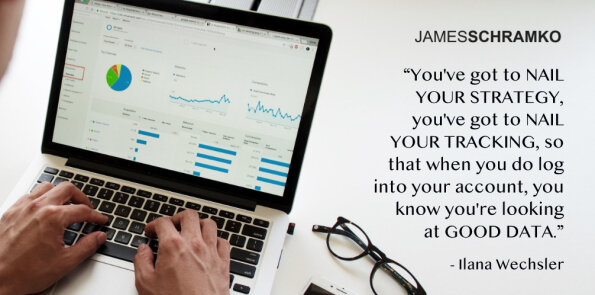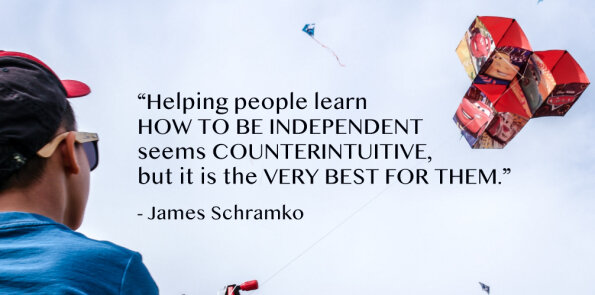Podcast: Download (Duration: 21:06 — 23.1MB)
Get Notified Of Future Episodes Apple Podcasts | Spotify | Amazon Music | Android | Blubrry | Gaana | TuneIn | Deezer | Anghami | RSS | More
There’s a learning curve in setting up effective paid traffic campaigns – that’s why many people engage agencies. Teach Traffic’s Ilana Wechsler, however, has come up with a safer solution for those willing to learn the ropes.
In this episode, Ilana shares a kite-flying analogy of her method.
She talks about the role of the traffic expert in setting up a campaign.
And she discusses the things you’ve got to get right for a paid traffic campaign to work.
Table of contents
1. The perspective of an agency owner and educator
2. It’s a lot like flying a kite…
3. What a traffic expert’s got to do
4. The sweet spot for Ilana and team
5. Steps you’ve got to nail for a campaign to work
6. Sound overwhelming? Good news, there’s help
7. The advantages of a hybrid traffic service
The perspective of an agency owner and educator
Ilana has feet in two camps, running a traffic agency and teaching business owners how to run their own accounts. This gives her unique insight into the industry.
The decision to keep a foot, or more a toe, in the agency world was a deliberate one. Ilana has no plans to grow a big agency, but she does love traffic, and in order to teach it credibly, she feels she needs to still do it.
With this in mind, Ilana has retained a selection of clients that gives her exposure to various different industries and strategies. Doing this keeps her up to date with industry best practice.
It also lets her discern what Google and Facebook want, and decipher good from bad strategy. And she stays on top of developments like the ongoing shift to AI and features like Performance Max.
It’s a lot like flying a kite…
From her teaching experience, Ilana knows there are myriad elements one needs to get right to succeed at paid traffic. And she can deliver the best training in the world but still have some students slip up somewhere, something she’s done herself while learning.
Then it dawned on her: what if she could just set everything up for people and then hand them their account to run?
It would be much like her experience flying a kite with her kids. On their own, the children couldn’t get the thing in the air, but once Ilana had it flying she could hand the strings over to them.
Then when the kids were experienced keeping the kite in the air, they could learn the harder skill of getting it up themselves.
What a traffic expert’s got to do
James thinks it makes a lot of sense. And the main difference from the industry approach is Ilana will be collaborating more with the client in the education process, not just doing it for them anymore.
What she will do is have a strategy session with the client, asking what they want to achieve. And she’ll be auditing their account, seeing what they have to work with.
Then, more likely than not, she’ll be rebuilding their accounts, which she says is actually easier than the alternative, because it eliminates all the sneaky settings and adjustments that may be buried in some hidden cranny. They’ll know from the outset that they’ve built it correctly.
A benefit of working with Ilana is she’s run traffic for a decade, with practically every industry and sales funnel under the sun. She’s done some weird and wonderful niches, great fodder for party conversation.
So she’s seen what works and what doesn’t work, and can help her clients bypass a lot of failure.
The sweet spot for Ilana and team
Naturally, Ilana and her team are setting up the tracking and the data, because they can’t do anything without good data.
That’s where their sweet spot is someone who has an existing account, who’s run traffic before. Even if it’s worked only mildly okay, it gives them enough data to identify what to avoid and what to double down on.
You can’t steer a parked car, says James. That’s why he only works with people who have something in motion, because it eliminates all the uncertainty. Yes, there’s an engine, yes, it can steer, yes, it moves. Let’s get it into the next gear.
Steps you’ve got to nail for a campaign to work
When people have played the game and it hasn’t worked, says James, a lot of the time they likely don’t know why. And he recalls Ilana saying to him, if any one step in the paid traffic process is not quite right, the whole thing doesn’t work.
That’s right, says Ilana. And of those steps, the first is nailing your strategy.
You’ve got to be participating in the right way within your market. If you’ve got a local business, you have to do Google search traffic; if you’ve got a lawn mowing business, perhaps it’s pretty much a mobile campaign, and you’ll need to optimize that.
You’ve got to nail your strategy, you’ve got to nail your tracking, so that when you do log into your account, you know you’re looking at good data.
You’ve got to nail your keyword research so that you’re showing up for the right keywords and preventing the wrong keywords. You’ve got to write good ads, and then you’ve got to build your account the right way, with the right structure.
Sound overwhelming? Good news, there’s help
There’s a lot of little things people don’t realize, says Ilana, and to be fair it is a lot to take in.
And anyone who’s good at what they do, says James, which is likely not teaching traffic, will be focused on that thing. To be good at traffic sounds like such hard work.
So can Ilana help people who don’t know how to do the traffic stuff, but would like it done for them?
Indeed, yes, says Ilana. She’s tested the process, and has been honestly shocked at how well it’s worked.
One of her clients had a lawn mowing business, and his account was a mess. Ilana did an audit for him and broke down his account – Here’s what’s going on. Here’s how you need to fix it.
Ilana, he says, I just don’t have time – can you do this for me? Ilana and her team smashed it out for him in a couple of days.
For a one-off fee, you get a strategy session, you get your account audited and rebuilt, you get all the best practice done. Then Ilana hands your account over to you, and literally all you need do is turn your campaign from paused to active.
Having said that, they don’t always get it right from the outset, which is where optimizing comes in. Ilana will go one-on-one with you, live on a Zoom call, through your campaigns, to show you and teach you what to look for.
The alternative to all this is paying a big agency each and every month to fly your kite for you, and never learn yourself how to fly the kite, or even to understand what they’re doing.
The advantages of a hybrid traffic service
So basically, says James, it’s like a done-with-you program. Ilana will help you every step of the way and make sure you know how to fly a kite, and she’ll stick around and teach you how to do the tricks and stunts without getting caught in the power lines.
You’re getting all the stuff you value in an agency, but you’ll also learn enough to take over the controls, and get coaching on a continuing basis to optimize, tune and prosper.
Helping people learn how to be independent seems counterintuitive, says James, but it is the very best for them.
And it’s very rewarding, Ilana says, because you can see great results from the outset. With one particular person they helped, they launched the campaigns and immediately got about a 10 percent conversion rate out of the gates. And that’s without even optimizing anything, which is unheard of in her industry.
This service is so new, Ilana hasn’t even got a page for it yet.
Join thriving, like-minded business owners inside the JamesSchramko membership
Liked the show? Leave us a review on iTunes












Ilana is so great! Thank you James for bringing her back on your show!
Thank you!